True story: an associate pastor in her late 20s visits “Gladys,” an older member of the congregation. When Gladys wonders why the senior pastor isn’t visiting her, the associate explains that her colleague is on vacation. Gladys nods, smiles and remarks in an encouraging tone, “How nice for you! You get to practice.”
In one sense, Gladys isn’t wrong. To speak of “the practice of ministry” is to acknowledge that no one ever really perfects a vocation — we are always practicing. Yet many who serve in their 20s and 30s, both inside and outside the church, sometimes encounter an attitude that assumes younger adults are merely rehearsing for the “real” work they will do when they’re older.
Though age brings experience and — one hopes — wisdom, not all those called by God have reached the age of Abraham. Samuel, Esther, David, Mary and others in Scripture were given weighty responsibilities at young ages: to speak truth to power, advocate for God’s people, lead a nation and bear the Savior of the world. Asked to submit to The Lutheran names of leaders under 40 who are making a difference, one ELCA member wrote back: “Jesus Christ.”
The 10 profiles on these pages represent nearly 100 people nominated by fellow church members for their real, concrete leadership in the here and now. They are artists and community activists, teachers and theologians, pastors and elected officials who are living and working in urban and rural settings throughout the country.
The stories of these very different people echo several common themes, perhaps giving insight into what this generation as a whole brings to the church:
A vocational identity rooted in community, both within the church institution and with neighbors beyond its walls.
A clear understanding that the work for social justice grows out of deep faith in the Christian gospel and is essential to the calling of the church.
An exhortation to the church to strive to reflect the increasing diversity of its contexts, recognize the changing shape and nature of “church,” and engage in issues facing communities and the nation.
All the leaders profiled here are putting their ideas and words into action. They are engaged in the practice of ministry but aren’t just “practicing.” Rather, they are actively responding to God’s call through their daily vocations. They are just a few of the many shaping our church now and for the future.
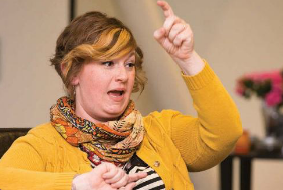
Photo by Ben VanHouten
Liz Colver (33): Community organizing specialist, Northwest Washington Synod, Seattle.
LIZ COLVER
What’s your calling?
“To give congregations access to the language and tools of community organizing that can help open doors that were closed … and send the church back into the neighborhood, not only around the church building but with the neighbors of church members,” Liz Colver said. “Community organizing and intentional relationships are things that Jesus tells us to do.”
At 9 years old, Liz Colver came home from Sunday school at Luther Memorial Lutheran Church in Seattle and told her mother: “I want to be a monk like Martin Luther.”
Learning that her gender barred her from the monastery surprised, but did not stop, her: “I knew I was called to serve in the church, but not as a pastor, youth director, musician or church secretary.”
Years later while in seminary, Colver discovered the Lutheran Deaconess Community. “Here was an intentional community of women in spiritual relationship with each other to become bold and prophetic leaders,” she said. “These were my people.” The feeling repeated itself when, on internship, she was introduced to community organizing.
In March 2015, Colver was consecrated as a deaconess to serve as the ELCA’s first community organizing specialist.
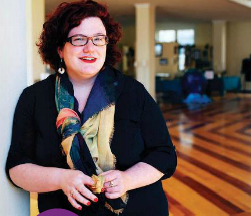
Photo by The Commercial Appeal/Landov
Mary Button (31): Minister of the arts, First Congregational Church, Memphis, Tenn.
MARY BUTTON
Why an arts ministry?
“Some people are auditory learners and get a lot out of sermons. Some are visual and are helped by seeing art,” Mary Button said. “And some are tactile, kinesthetic learners who connect through action and participation. I want to bring people together in creating art [to have] a profound experience of community.”
Mary Button wants you to notice what Jesus looks like in your church — literally. From her Lutheran upbringing in southeast Texas onward, Button has found that “the same images of Jesus” pop up in most congregations. And those images are static — “they no longer reflect the diversity of the body of Christ,” she said.
Button’s calling is to change that. In her congregational arts ministry, this means welcoming members of all ages to participate in the collaborative art installations she designs for each season of the church year.
Button has also created a “Stations of the Cross” series since 2010, each year connecting the Passion story to a contemporary context such as mental illness, mass incarceration, and lesbian, gay, bisexual and transgender issues. Downloads and prints of Button’s stations, available online, have been displayed in congregations across the U.S. and overseas.
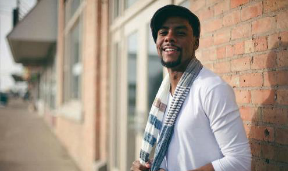
Photo by Josh Collins
Joe Davis (28): Poet-in-residence, Redeemer Lutheran Church, Minneapolis.
JOE DAVIS
How do poetry and faith intersect?
“All of my favorite pastors and preachers use poetic images. All of my favorite poets have theology in their work,” Joe Davis said. “Faith is being fully enfleshed in the living, breathing word — our relationship to God is poetry. I believe that we are co-creators with God, forming a beautiful, beloved community that we long to live in. Everyone has a creative spark.”
Looking back, Joe Davis sees the Spirit in a series of “connecting points” that led him to the Lutheran church. Raised Pentecostal, he found a place at Lutheran Campus Ministry at Minot (N.D.) State University, where service trips to New Orleans and Washington, D.C., taught him about “praying with hands and feet.”
A friendship with Lutheran hip-hop artist AGAPE (David Scherer) brought Davis to Minneapolis, where today he is one of several young adults living at Redeemer’s Glenwood House and engaging in relational ministry in the community. In addition to composing and performing poetry, Davis teaches creative writing classes every Friday at a high school.
“I sometimes joke that I’m a ‘Luthercostal,’ ” he said, “but in my heart of hearts I’m ecumenical and interdenominational. Still, the Lutheran church is my favorite.”
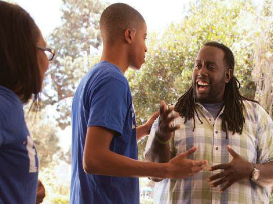
Photo by Dave Nagel
Jonathan Hemphill (35): Pastor, Another Level Ministries, Los Angeles.
JONATHAN HEMPHILL
What is the ELCA’s calling?
“Our heritage and theology is rich, but our system has to change to attract people under 40 and people of color,” Jonathan Hemphill (right) said. “We need to recruit competent, relevant, contextual leaders … [and teach] budgeting, how to manage changing communities, Spanish-immersion.”
The road Jonathan Hemphill has taken to follow God’s call reminds him of The Wizard of Oz: requiring “courage, strength and facing obstacles.” His path — not unlike Dorothy’s — has also led him back home: in this case, to the ELCA.
Growing up Lutheran in his native Los Angeles, Hemphill said, “I always knew [the ELCA] was where I belonged, but there didn’t seem to be a clear path for someone like me.”
Hemphill was ordained by the American Baptist Churches and started a successful “Christian Club” at a community college. He also founded a mission, which quickly grew out of its borrowed space and moved to an ELCA congregation. About then, Hemphill recalled, “my home pastor said, ‘You need to come home.’ ”
Hemphill entered the TEEM (Theological Education for Emerging Ministries) program, an alternate route to ordination in the ELCA. This fall his ordination will be transferred to the ELCA as he continues serving as pastor of Another Level Ministries, now a synodically authorized worshiping community.
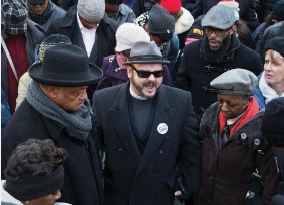
Photo by Joe Brusky Photography
Steve Jerbi (37): Pastor, All Peoples Church, Milwaukee.
STEVE JERBI
What is the ELCA’s calling?
“As a church with a theology of the cross, we are called into places of suffering, [like] police/community engagement, not only in solidarity but also to cast another vision …,” Steve Jerbi said. “There’s a reason the vision of Revelation is a new Jerusalem, a new city. The urban core is not a wasteland. It’s the promised land.”
No one is more surprised than Steve Jerbi at the fact that God’s call led him to the city. A Lutheran pastor’s kid from a farm town in western Illinois and a former camp program director, Jerbi entered seminary to study environmental theology and return to outdoor ministry.
An urban CPE (clinical pastoral education) program in Chicago and an internship in Minneapolis changed all that, helping Jerbi realize urban ministry was his calling. He has served for almost eight years as pastor of All Peoples Church, a congregation he describes as “65 percent African-American, 25 percent white, 15 percent Latino, 70 percent people in poverty and 50 percent under 25.”
Young adults make up the fastest-growing demographic of All Peoples. Jerbi attributes this to the congregation’s involvement in social justice activism and an explicit focus on young people that “is in everything we do. It isn’t just lip-service.”
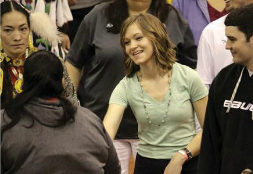
Photo by Sean Lee
Kylie Oversen (26): State representative, North Dakota House of Representatives, Grand Forks, N.D.
KYLIE OVERSEN
What’s your calling?
“Broadly, public service. Once I got into the legislature, I found new ways I was able to express my faith in the area of social justice,” Kylie Oversen said. “I was proud to be an ELCA Lutheran in a discussion about discrimination based on sexual orientation … to say ‘some of us are called to social justice and equality as part of our faith, not against our faith.’”
Kylie Oversen had never considered politics until her senator sent a Facebook message asking her to run for state representative. Even then, she admitted, “I had to read it several times.”
Working with city and state government leaders as student body president of the University of North Dakota, Grand Forks, had shown Oversen “a lack of young people involved in the process.” She said this encouraged her to become “a needed voice at the table, [someone] who knows what it’s like to be a student.”
Her support system includes the Christus Rex Lutheran Campus Ministry at UND, a “second home and family” that is still her faith community.
Currently, Oversen balances her legislative duties with law school. In March she was elected chair of the Democratic Party in North Dakota.
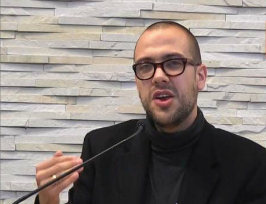
Photo by Danielle Burrus
Rob Saler (35): Executive director, Center for Pastoral Excellence, Christian Theological Seminary, Indianapolis.
ROB SALER
What’s the church’s calling?
“The ELCA should think in terms of how we can be stewards of a legacy that flows out beyond our walls … allowing for closure of congregations honorably and without a sense of failure, and empowering and credentialing for new ministries,” Rob Saler said. “We will always need traditional full-time pastors and congregations, but we need to expand the ‘R and D arm’ (research and dvelopment) in nontraditional, vibrant, experimental ministry.”
Rob Saler’s description of the church as a “diffusively spatialized event” is a mouthful. But for this ELCA theologian, teacher and director of a center that aims to discover and support excellence in ministry, it means that church becomes “more like an event than an institution” and “there is no one-size-fits-all answer.”
A lifelong Lutheran from southern Illinois, Saler found himself drawn both to academic study and pastoral ministry. He was ordained while completing his doctorate at the Lutheran School of Theology at Chicago. He served two ELCA congregations before being called to Christian Theological Seminary, where he now directs the Center for Pastoral Excellence. Saler also teaches Lutheran studies in conjunction with the Indiana/Kentucky Synod, designing courses that bring seminarians, pastors in continuing education and laity together.
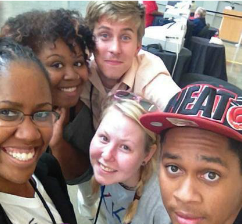
Rozella White (33): ELCA program director for young adult ministry, Chicago.
ROZELLA WHITE
What is the ELCA’s calling?
“To be a community hub and center, a broader expression of community coming together 24/7,” Rozella White said. “We need to develop leaders who look like the world we live in.”
Rozella White jokes, “I’m a unicorn: a third generation black and Puerto Rican Lutheran.” Active in her home congregation in Houston, White still never had a church calling in mind.
After a difficult period involving her grandmother’s cancer, college plans that didn’t pan out and “a depressive episode,” White worked at a Lutheran camp in Texas. She was then hired part time by a small, urban Lutheran congregation and became a synod intern for LYO (Lutheran Youth Organization) events.
White “fell in love with ministry,” especially with older youth and young adults. She earned a certification in youth ministry and later returned to seminary to put theological language to what she had experienced in so many ministry settings: a need for the church to re-examine its traditional structures within the context of modern communities.
Called in 2013 to her current leadership position at the churchwide office, White sees herself as a “bridge-builder,” seeking to help the ELCA find ways to share “Lutheran theological underpinnings with young adults who aren’t necessarily in church.”
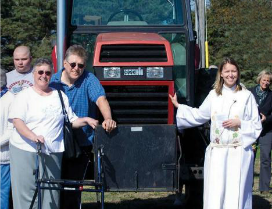
Photo by Sarah Bakalyar
Rachel Wrenn (30): Pastor, Prairie Star Ministries, southwestern Minnesota.
RACHEL WRENN
What’s your calling?
“I’m learning that God calls all of who we are to a certain place at a certain time,” Rachel Wrenn said. “Gifts and talents, weaknesses and scars, are all tools God uses to do ministry. How do you lead at five congregations? It calls a pastor to be an equipper. … It is both as simple and as complicated as being vigilant to where God is working.”
Rachel Wrenn grew up in Washington, Minnesota and Alaska — but never in a rural setting. When she was called as a pastor of Prairie Star Ministries, a parish of five ELCA congregations on the prairie of southwestern Minnesota, “it felt like coming home in a new and different way,” she said.
Wrenn is inspired by the way the parish decided nine years ago to join together in what she calls “less a melding of identities and more a melding of mission.” Citing the verse from Matthew about two or three gathered together in Jesus’ name, she said, “So where five are gathered, Jesus must even more be there!”
The pastor is now in her fourth year at Prairie Star Ministries, which also includes Shalom Hill Farm, a retreat and continuing education center for rural ministry.
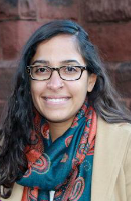
Photo by Emma Williams
Bianca Vazquez (26): Experiential learning coordinator, Steinbruck Center, Luther Place Memorial Church, Washington, D.C.
BIANCA VAZQUEZ
What inspires you?
“The Community Craft Collective (a ministry of Luther Place), a group of women, youth and men committed to each other who by every measure of our world shouldn’t be in relationship,” Bianca Vazquez said. “The church can also be a place of unlikely relationships where we do life together.”
If you’ve ever pondered an urban immersion experience to Washington, D.C., for a high school mission trip or alternative spring break, you’ve probably talked to Bianca Vazquez.
Four years ago, Vazquez, Roman Catholic by background, was seeking a post-college volunteer experience that was “GLBT-friendly, anti-racist and anti-[oppressive].” Lutheran Volunteer Corps fit the bill, matching her with the Steinbruck Center, a ministry of Luther Place Memorial Church, where she now remains as coordinator.
Vazquez’s vision for the center’s work is to help visitors — often from largely Caucasian, middle-class contexts — to “see service differently.”
“A lot of people want to see tangible results from their time, but the purpose of a trip is not to change the context you’re going to,” she said. “It’s to listen, learn to critically analyze, so you can go back equipped to be a leader in your own context where you’re the expert. … Sometimes people say ‘I didn’t do anything,’ but the ministry of presence is important.”




